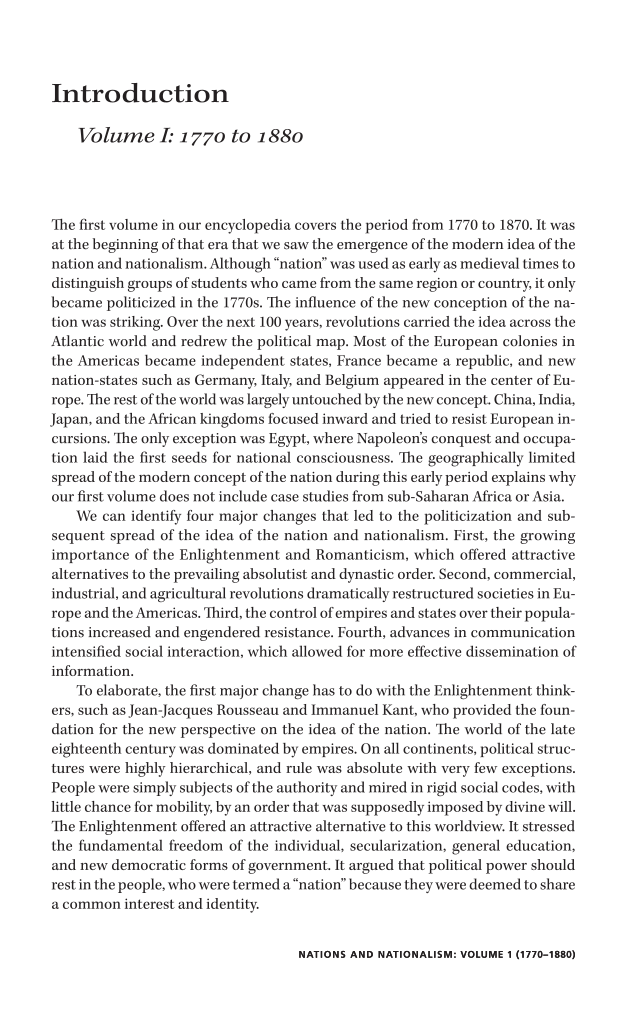Introduction Volume I: 1770 to 1880 NATIONS AND NATIONALISM: VOLUME 1 (1770–1880) Th e fi rst volume in our encyclopedia covers the period from 1770 to 1870. It was at the beginning of that era that we saw the emergence of the modern idea of the nation and nationalism. Although “nation” was used as early as medieval times to distinguish groups of students who came from the same region or country, it only became politicized in the 1770s. Th e infl uence of the new conception of the na- tion was striking. Over the next 100 years, revolutions carried the idea across the Atlantic world and redrew the political map. Most of the European colonies in the Americas became independent states, France became a republic, and new nation-states such as Germany, Italy, and Belgium appeared in the center of Eu- rope. Th e rest of the world was largely untouched by the new concept. China, India, Japan, and the African kingdoms focused inward and tried to resist European in- cursions. Th e only exception was Egypt, where Napoleon’s conquest and occupa- tion laid the fi rst seeds for national consciousness. Th e geographically limited spread of the modern concept of the nation during this early period explains why our fi rst volume does not include case studies from sub-Saharan Africa or Asia. We can identify four major changes that led to the politicization and sub- sequent spread of the idea of the nation and nationalism. First, the growing importance of the Enlightenment and Romanticism, which off ered attractive alternatives to the prevailing absolutist and dynastic order. Second, commercial, industrial, and agricultural revolutions dramatically restructured societies in Eu- rope and the Americas. Th ird, the control of empires and states over their popula- tions increased and engendered resistance. Fourth, advances in communication intensifi ed social interaction, which allowed for more eff ective dissemination of information. To elaborate, the fi rst major change has to do with the Enlightenment think- ers, such as Jean-Jacques Rousseau and Immanuel Kant, who provided the foun- dation for the new perspective on the idea of the nation. Th e world of the late eighteenth century was dominated by empires. On all continents, political struc- tures were highly hierarchical, and rule was absolute with very few exceptions. People were simply subjects of the authority and mired in rigid social codes, with little chance for mobility, by an order that was supposedly imposed by divine will. Th e Enlightenment off ered an attractive alternative to this worldview. It stressed the fundamental freedom of the individual, secularization, general education, and new democratic forms of government. It argued that political power should rest in the people, who were termed a “nation” because they were deemed to share a common interest and identity. NATIONS AND NATIONALISM: VOLUME 1 (1770–1880)
Document Details My Account Print multiple pages
Print
You have printed 0 times in the last 24 hours.
Your print count will reset on at .
You may print 0 more time(s) before then.
You may print a maximum of 0 pages at a time.




























































































































































































































































































































































































































































































































































































































































































































































































































































































































































































































































































































































































































































































































































































































































































































































































































































































































































































































































































































































































































































































































































































































































































